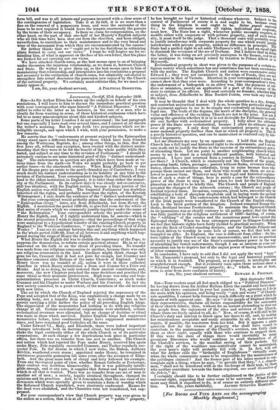I am, Sir, your obedient servant, EDWARD A. FREEMAN. Sin—Your
readers must all feel much obliged to a28"Politicali SetebDeisrerntz.r for having drawn from Sir Arthur Hallam Elton the candid and lucid state- ment of his views contained in your last number. Yet, agreeing as I do in the main with his opinions, and being really "sick and weary" of Church rate squabbles, I cannot help foreseeing much difficulty on a point which he disposes of with apparent ease. He says "if the people of England through their representatives, disclaim all future responsibility for the sustenance of their church fabrics, then, without for an instant pretending to shut out the people from the enjoyment of the rites and services of the Church, whose doors are freely opened to all, &c." Now of course, it will still be the Church's duty and interest to throw open her doors to all, and, by making her ministrations acceptable and easily attainable by all, to endeavour to regain, if possible, the wanderers from her fold. But it appears a grave question how far the owners of property who shall have ceased to contribute to the maintenance of the Church's services, can fairly chum th em as their right, equally with those who continue to support them. If this were the state of things there would inevitably be manX pecuniary Dissenters who would continue to avail themselves of _al! the Church's services, to the manifest saving of their pockets. -1.t if the right of the wealthier non-contributor cannot be maintained, the poor man's right will probably fall with it. In fact, will not what Sir Arthur calls the "birthright of Englishmen" virtually cease; when the whole community ceases to be responsible for the meintenance the privileges claimed? And the former part of his letter seemedetouear template such a thing, where he says, "to provide that they," i. e.. .,c2L men, "shall not be interfered with in the discharge of then- task, bY_raur, who neither contribute towards the funds required, oor avail thenuetra the fabric," &e. I certainly should like to be further enlightened on the justice of this I right, supposing that rates cease to be universal. What Perlis- ment may think it expedient to do, is of course an entirely different ques- [For BOOKS and FINE ARTS see the acconzpanying Monthly Supplement.]


































 Previous page
Previous page